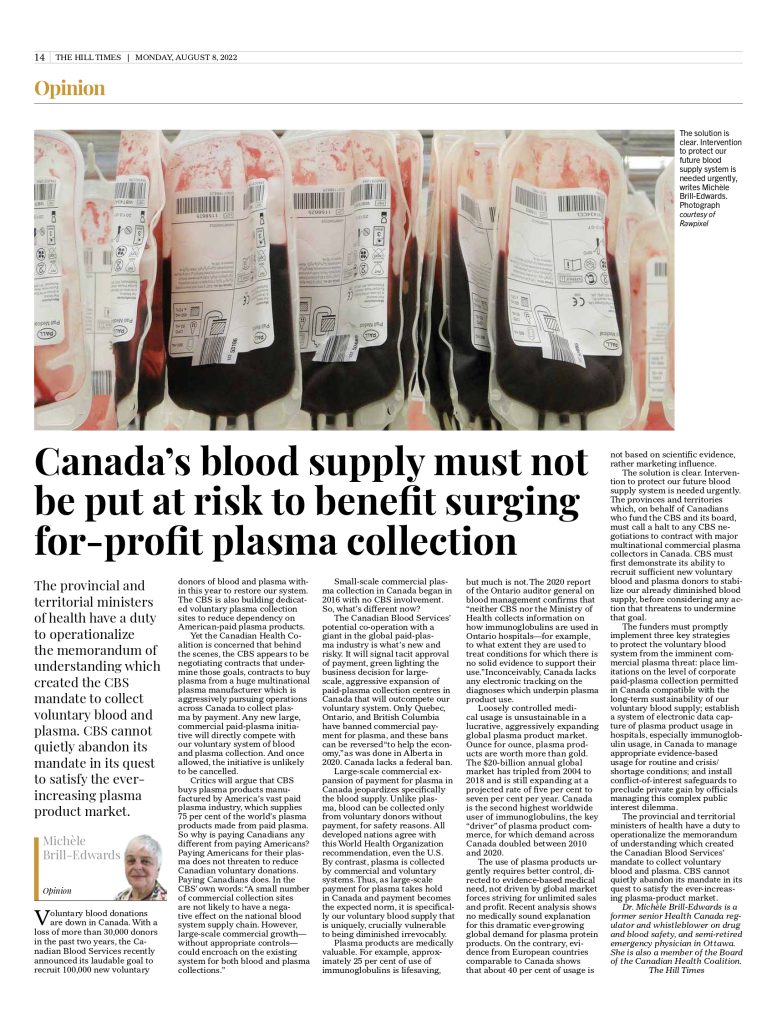Health Coalition raises alarm over risk to voluntary blood supply from for-profit corporations
The Canadian Health Coalition has been raising the alarm about the risk posed to our voluntary blood collection system by for-profit, plasma collection companies. The coalition hosted “Corporations want your blood: a webinar” on July 20, 2022, which was followed by the article “Canada’s blood plasma collection to be sold off to foreign pharma giant” published by The Breach on August 2, 2022.
This week, Canadian Health Coalition Board member Dr. Michèle Brill-Edwards had this opinion article published by The Hill Times on August 8, 2022.
Canada’s blood supply must not be put at risk to benefit surging for-profit plasma collection
Voluntary blood donations are down in Canada. With a loss of more than 30,000 donors in the past two years, the Canadian Blood Services recently announced its laudable goal to recruit 100,000 new voluntary donors of blood and plasma within this year to restore our system. The CBS is also building dedicated voluntary plasma collection sites to reduce dependency on American-paid plasma products.
Yet the Canadian Health Coalition is concerned that behind the scenes, the CBS appears to be negotiating contracts that undermine those goals, contracts to buy plasma from a huge multinational plasma manufacturer which is aggressively pursuing operations across Canada to collect plasma by payment to Canadians. Any new large, commercial, paid-plasma initiative will directly compete with our voluntary system of blood and plasma collection. And once allowed, the initiative is unlikely to be cancelled.
Critics will argue that CBS buys plasma products manufactured by America’s vast paid-plasma industry, which supplies 75 per cent of the world’s plasma products made from paid plasma. So why is paying Canadians any different from paying Americans? Paying Americans for their plasma does not threaten to reduce Canadian voluntary donations. Paying Canadians does. In the CBS’ own words: “A small number of commercial collection sites are not likely to have a negative effect on the national blood system supply chain. However, large-scale commercial growth—without appropriate controls—could encroach on the existing system for both blood and plasma collections.”
Small-scale commercial plasma collection in Canada began in 2016 with no CBS involvement. So, what’s different now?
The Canadian Blood Services’ potential co-operation with a giant in the global paid-plasma industry is what’s new and risky. It will signal tacit approval of payment, green lighting the business decision for large-scale, aggressive expansion of paid-plasma collection centres in Canada that will outcompete our voluntary system. Only Quebec, Ontario, and British Columbia have banned commercial payment for plasma, and these bans can be reversed “to help the economy,” as was done in Alberta in 2020. Canada lacks a federal ban.
Large-scale commercial expansion of payment for plasma in Canada jeopardizes specifically the blood supply. Unlike plasma, blood can be collected only from voluntary donors without payment, for safety reasons. All developed nations agree with this World Health Organization recommendation, even the U.S. By contrast, plasma is collected by commercial and voluntary systems. Thus, as large-scale payment for plasma takes hold in Canada and payment becomes the expected norm, it is specifically our voluntary blood supply that is uniquely, crucially vulnerable to being diminished irrevocably.
Plasma products are medically valuable. For example, approximately 25 per cent of use of immunoglobulins is lifesaving, but much is not. The 2020 report of the Ontario auditor general on blood management confirms that “neither CBS nor the Ministry of Health collects information on how immunoglobulins are used in Ontario hospitals—for example, to what extent they are used to treat conditions for which there is no solid evidence to support their use.” Inconceivably, Canada lacks any electronic tracking on the diagnoses which underpin plasma product use.
Loosely controlled medical usage is unsustainable in a lucrative, aggressively expanding global plasma product market. Ounce for ounce, plasma products are worth more than gold. The $20-billion annual global market has tripled from 2004 to 2018 and is still expanding at a projected rate of five per cent to seven per cent per year. Canada is the second highest worldwide user of immunoglobulins, the key “driver” of plasma product commerce, for which demand across Canada doubled between 2010 and 2020.
The use of plasma products urgently requires better control, directed to evidence-based medical need, not driven by global market forces striving for unlimited sales and profit. Recent analysis shows no medically sound explanation for this dramatic ever-growing global demand for plasma protein products. On the contrary, evidence from European countries comparable to Canada shows that about 40 per cent of usage is not based on scientific evidence, rather marketing influence.
The solution is clear. Intervention to protect our future blood supply system is needed urgently. The provinces and territories which, on behalf of Canadians who fund the CBS and its board, must call a halt to any CBS negotiations to contract with major multinational commercial plasma collectors in Canada. CBS must first demonstrate its ability to recruit sufficient new voluntary blood and plasma donors to stabilize our already diminished blood supply, before considering any action that threatens to undermine that goal.
The funders must promptly implement three key strategies to protect the voluntary blood system from the imminent commercial plasma threat: place limitations on the level of corporate paid-plasma collection permitted in Canada compatible with the long-term sustainability of our voluntary blood supply; establish a system of electronic data capture of plasma product usage in hospitals, especially immunoglobulin usage, in Canada to manage appropriate evidence-based usage for routine and crisis/shortage conditions; and install conflict-of-interest safeguards to preclude private gain by officials managing this complex public interest dilemma.
The provincial and territorial ministers of health have a duty to operationalize the memorandum of understanding which created the Canadian Blood Services’ mandate to collect voluntary blood and plasma. CBS cannot quietly abandon its mandate in its quest to satisfy the ever-increasing plasma-product market.




